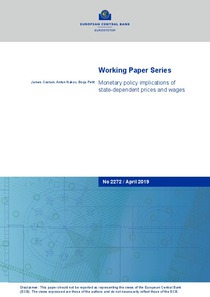Monetary policy implications of state-dependent prices and wages
"We study the effects of monetary shocks in a model of state-dependent price and wage adjustment based on “control costs”. Suppliers of retail goods and of labor are both monopolistic competitors that face idiosyncratic productivity shocks and nominal rigidities. Stickiness arises because preci...
| Main Authors: | , , |
|---|---|
| Institution: | ETUI-European Trade Union Institute |
| Format: | TEXT |
| Language: | English |
| Published: |
Frankfurt am Main
2019
ECB |
| Subjects: | |
| Online Access: | https://www.labourline.org/KENTIKA-19307736124911259189-Monetary-policy-implications-o.htm |
| Summary: | "We study the effects of monetary shocks in a model of state-dependent price and wage adjustment based on “control costs”. Suppliers of retail goods and of labor are both monopolistic competitors that face idiosyncratic productivity shocks and nominal rigidities. Stickiness arises because precise decisions are costly, so agents choose to tolerate small errors in the timing of adjustments. Our simulations are calibrated to microdata on the size and frequency of price and wage changes. Money shocks have less persistent real effects in our state-dependent model than they would a time-dependent framework, but nonetheless we obtain sufficient monetary nonneutrality for consistency with macroeconomic evidence. Nonneutrality is primarily driven by wage rigidity, rather than price rigidity. State-dependent nominal rigidity implies a flatter Phillips curve as trend inflation declines, because nominal adjustments become less frequent, making short-run inflation less reactive to shocks." |
|---|---|
| Physical Description: | 57 p. Digital |

